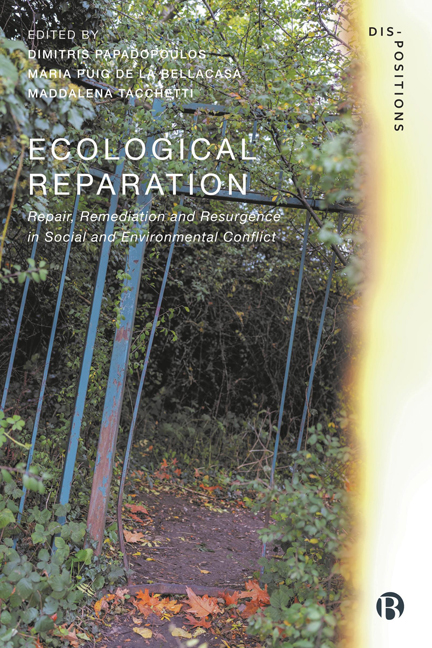Book contents
- Frontmatter
- Contents
- List of Figures
- Notes on Contributors
- Acknowledgements
- Note on the Figures
- Dis-Positions Series Preface
- Introduction: No Justice, No Ecological Peace: The Groundings of Ecological Reparation
- PART I Depletion<>Resurgence
- PART II Deskilling<>Experimenting
- PART III Contaminating<>Cohabiting
- PART IV Enclosing<>Reclaiming Land
- PART V Loss<>Recollecting
- PART VI Representing<>Self-governing
- PART VII Isolating<>Embodying
- PART VIII Growth<>Flourishing
- Index
1 - Experiments in Situ: Soil Repair Practices as Part of Place-Based Action for Change in El Salvador
Published online by Cambridge University Press: 28 March 2024
- Frontmatter
- Contents
- List of Figures
- Notes on Contributors
- Acknowledgements
- Note on the Figures
- Dis-Positions Series Preface
- Introduction: No Justice, No Ecological Peace: The Groundings of Ecological Reparation
- PART I Depletion<>Resurgence
- PART II Deskilling<>Experimenting
- PART III Contaminating<>Cohabiting
- PART IV Enclosing<>Reclaiming Land
- PART V Loss<>Recollecting
- PART VI Representing<>Self-governing
- PART VII Isolating<>Embodying
- PART VIII Growth<>Flourishing
- Index
Summary
Introduction
The soil has never been flat, empty or inert. The solid phase of minerals, gases and organic matter that make up what is known as the ‘pedosphere’ teems with microbial communities in perpetual interaction; with the remains of once-living things in re-composition; with disintegrating rock and crystalline minerals; with slow-growing root-systems and, between them, burrowing macro-organisms. We would not have food without these inter-relating elemental processes, or without the millennia of experimental practices that have developed for understanding and working with them.
The major centres of plant domestication that emerged with modern agriculture depended on these vernacular practices, although local soil knowledge was progressively marginalized as generalizable scientific principles were extracted (Barrera-Bassols and Zinck, 2003). In the contemporary world, peasant agriculture is often considered primitive or ‘under-developed’, even although it has survived precisely via innovation and adaption (van der Ploeg, 2014). The process of marginalization has been accelerated through the rise of economic vocabularies of profit and production through the course of the twentieth century, which have worked to redefine the soil as ‘exploitable and potentially modifiable genetic material’ (Krzywoszynska and Marchesi, 2020: 195). This seems paradoxical, however, because many contemporary agricultural and medical plant-based products were originally sourced from local agricultural knowledge, usually without recompense (Hayden, 2020). It is also deeply concerning, because an ‘extractivist’ approach to agriculture cannot be applied endlessly without exhausting the soil’s vitality (Rist and Dahdouh-Guebas, 2006; Puig de la Bellacasa, 2015; Gray and Sheikh, 2018).
This relegation of everyday agricultural expertise has not, however, prevented the elaboration of vibrant agricultural alternatives. In Mexico, while Green Revolution technologies were being tested during the 1960s, experimental ecological practices were also being consolidated, based on an extensive cataloguing of existing traditional and indigenous approaches (Astier et al, 2017). Building on objections to precursors to Green Revolution projects, voiced as early as the 1940s, networks of agronomists, geographers and anthropologists worked to document the merits of traditional and smallscale farming practices, and consolidate more holistic understandings of soil, seeds and farming systems (Yapa, 1993). Since the 1960s, these networks have become associated under the term ‘agroecology’, denoting agricultural approaches that value ecological factors over other metrics.
- Type
- Chapter
- Information
- Ecological ReparationRepair, Remediation and Resurgence in Social and Environmental Conflict, pp. 19 - 36Publisher: Bristol University PressPrint publication year: 2023



